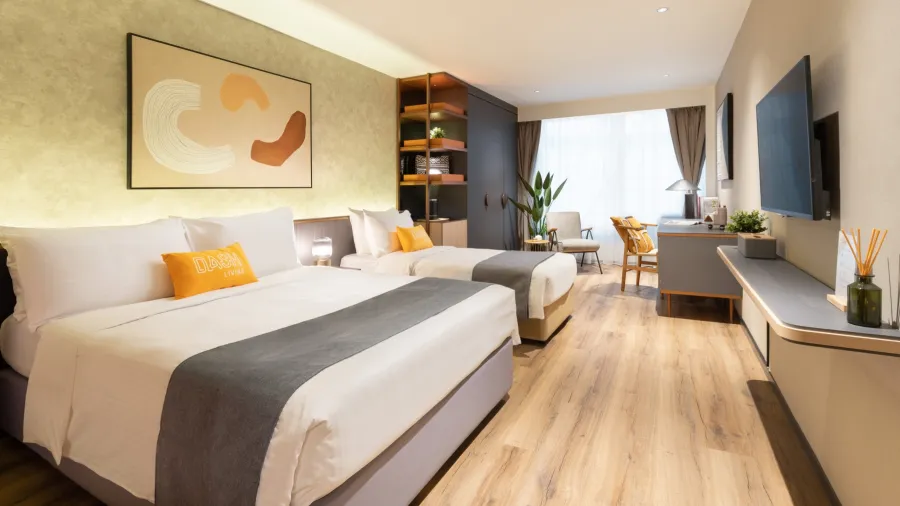
More hotels pivot to co-living for better margins, stable cash flow
From 2020 to 1Q23, around 6 to 7 hotels have been acquired for conversion to co-living spaces.
Over the past three years, many hoteliers began providing longer and extended stays to keep themselves afloat as borders remained closed. Investors saw his shift as an opportunity to acquire underperforming hotels and transform them into co-living spaces, which have been a hit amongst locals, particularly young professionals.
What makes hotel assets attractive to investors and co-living operators alike is their relatively “quick turnaround” and “minimal capital expenditure requirement versus other asset types.”
“Pricing for hotels was generally cheaper than the equivalent pricing for a comparable residential building for the same purpose,” Shaman Chellaram, Colliers’ senior director of Valuation & Advisory Services for Asia, told Hong Kong Business.
“Hotels themselves present an opportunity to potentially drive a higher return on investment; but bear in mind that each opportunity must be looked at on a case-by-case basis,” Chellaram said.
He said investors are also keen to convert hotels into co-living spaces since the latter’s model offers low operational expenses, requires fewer staff, and “when operated, well can provide strong margins and a more stable cash flow.”
“Apart from the ease of conversion and some pricing dislocation, hotels give co-living investors the additional flexibility of providing a combination of short stay and longer stay options for their guests, enabling the owners to operate a hybrid hotel slash co-living model to capture changes in demand and any potential uplift in their daily rate,” the Colliers expert said.
From hotels to co-living spaces
Converting hotels into co-living spaces may take as short as three weeks to as long as nine months, according to Aaron Lee, CEO of Dash Living. He said the length of time for conversion depends on how heavy the construction will be.
When converting hotels, Lee said his team looks at the building plans first. “We ensure compliance. We look at what spaces we can change, what spaces you can actually change the usage of or if change is even needed,” Lee told Hong Kong Business. He said this process may take anywhere from a couple of weeks to a month.
After the compliance check, Dash Living proceeds with the design process which includes picking areas in the building where they can extract the most value.
Before the co-living operator transformed Dash Living on Prat, the building’s basement used to be a restaurant. “This asset was acquired during the pandemic, so obviously, retail was heavily hit,” recalled Lee. “We realised the basement was underutilised and the business in the basement wasn’t so good."
That basement is now an almost 4,000 plus square-foot communal area. “That area contains all of the kitchen, laundry space, [and] meeting space. There’s also a multi-purpose room… for yoga and meditation events. There’s also pilates and yoga class for guests that happens there once in a while,” Lee said.
After the design process is the construction. As one of the project managers, Dash Living monitors the entire construction process. “We check the noise, smell, all these factors, when constructing the space,” Lee said.
But even during the construction phase, Dash Living already offers the units for sale to facilitate a quicker move-in for guests once all the work is completed.
Co-living’s rising popularity
In Hong Kong, about six to seven hotels have been acquired for conversion into co-living spaces. This figure accounts for around 2,038 keys or rooms.
Some hotels which have adapted the co-living model include Rosedale Hotel, Travelodge Hollywood, and Butterfly on Prat Hotel.
Dash Living, for its part, has helped 22 hotels in Hong Kong shift to a co-living model. Of these 22, Dash Living helped two with the actual conversion and construction.
Chellaram said co-living owes its popularity to the convenience and flexibility it offers, which tenants, particularly young professionals look for in their accommodation.
“People, especially at the earliest stage of their careers, want the convenience and flexibility of not being bound by long-term contracts and without the burden of having to buy their furniture and they want to live with like-minded people,” the Colliers expert said.
“Many co-living operators provide social activities, events and a sense of belonging to a wider network or community or ecosystem — and that’s something that tenants are very attracted to. There are also additional perks that come with opting for co-living. This ecosystem is especially attractive to young professionals entering the market or new people coming to the city from the mainland or overseas,” Chellaram said.
In Dash Living, one of the perks that tenants get is access to all their facilities — which is not confined in the building they are occupying.
“While people do pay a premium per square foot basis [in our rooms], they get access to all our facilities globally. We have 40 plus perks which tenants can use globally. These cover co-working and storage spaces, F&B, spa and wellness owned by our partners which they can use,” Lee shared.
A testament to co-living’s popularity in Hong Kong is its high occupancy rate. According to Chellaram, many operators in the city get 80%–90% occupancy and some are even running close to 100% with waiting lists.
“It’s been well documented in Hong Kong that the city does have a housing supply and affordability problem with property prices too high for most people to get on the ladder to own their own house. Now, with interest rates even higher, that makes it harder, so the demand for rental property is even higher, especially given the recent increase in demand from the new talent attraction schemes.Rentals in the private sector are [also] often costly,” the Colliers expert said.
“Co-living really kind of sits in the space to provide tenants with a hassle-free, plug and play, flexible, convenient, often well-designed, well-furnished, affordable living solution in good urban locations with a community feel and professional management,” Chellaram added.
Lee echoed this, adding that co-living supplements the problems that traditional accommodation is having.
Goodbye hotels?
Whilst Chellaram believes co-living’s popularity will only continue to grow moving forward, he does not think that this type of accommodation will overtake hotels.
The Colliers expert underscored that the two types of accommodation cater to different markets and end-users.
“Co-living fits for some people, but it’s not for everyone,” he added.
Chellaram also underscored that hotels have been seeing improvement in terms of occupancy. By end of June, occupancy of hotels in the city was around 82% with daily rates hitting $1,323.
The Colliers expert added that he sees co-living as a potential sub-sector of both hotels and the residential sector.
“I think [co-living is] a threat [to hotels] in the sense that where there are underperforming assets, then certain co-living operators may come in to acquire and reposition those assets. It does provide some competition in the mid-scale sector for mid-to-longer stay options.” Chellaram said.
“But in terms of an overall threat, I don’t see it. I think it’s complementary to the sector. It provides end users with a different accommodation option. In my view, all competition is good. It spurs creativity and new ideas in the sector and ultimately gives the customers more choice,” he added.
Lee echoed a similar sentiment, saying that co-living will not overtake traditional accommodation.
“I think [co-living] supplements the problem that traditional accommodation is having,” he said.
“Co-living will not be able to replace traditional accommodation, but for the big social issues around lifestyle, it definitely is a good solution for it,” he added.



















 Advertise
Advertise









